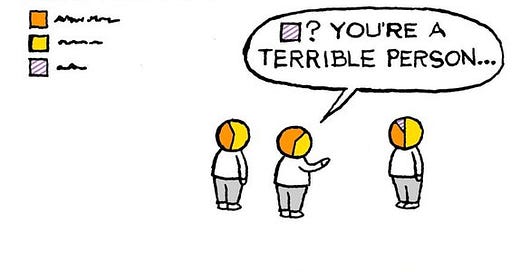A Great Way to Create What You Hate
When the stakes are high and the moment is brief, people try to force solutions that often make things worse. Here is a illustration to remember this powerful lesson.
Anyone that knows me knows how much I resist being told what to think and what to do. I know that I’m not the only one. And yet, if you watch fights on social media, you see people use ineffective tactics all the time. People scream, shame, blame, attack, smear, and say all sorts of terrible things.
Question: how often does the other person reply “Golly, you know you’re right! Thank you for bringing this to my attention. I will change my perspective from this moment on.”
Answer: never.
In fact, the person being attacked will often double down on their position. Onlookers may also feel bad/sympathy for the person being attacked. In short, the attacker may create more of what they purport to hate.
This is so beautifully captured by an image I found on Twitter a few years ago.
So what’s the alternative?
There are many great thinkers on this subject. I always default to Steven Covey’s “Seek First To Understand, Then To Be Understood” from The 7 Principles of Highly Effective People. Yes, it will not be effective in addressing sociopaths or those just itching for a fight. However, I feel that most people are less polarizing and more reasonable than our social media selves claim to be. If you take the time to ask, listen, and reflect, you will have way better odds at a successful outcome versus shout, shame, and defame.
After all, we both want to avoid creating more enemies, right?





Well shown and said, thanks.
I believe one of the reasons “seek first to understand” is so absolutely critical is because if I really want to communicate with another person, I do not them to feel defensive. Once that happens any hope of effectively exchanging ideas or thoughts is terminated. When I feel I am being verbally attacked, my mind shuts down my willingness to communicate. For the same reason, when trying to effectively communicate to a large group of people, it is critical to “know your audience”. In both cases, the only way to know them requires that you have listened to them.
Right on the money Rick! Thank you!